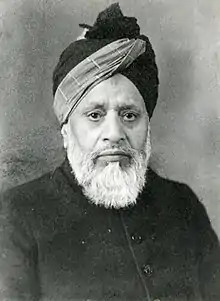Muhammad Ali | |
|---|---|
 An photograph of Maulana Muhammad Ali, possibly taken in the 1940’s | |
| Native name | محمد علي |
| Born | 1874 Murar, Kapurthala State, British India |
| Died | 13 October 1951 Karachi, Pakistan |
| Resting place | Lahore, Pakistan |
| Occupation | Writer |
| Language | Urdu, Arabic |
| Nationality | Pakistani |
| Literary movement | Lahore Ahmadiyya Movement |
| Part of a series on
Ahmadiyya |
|---|
 |
Muhammad Ali (/mɔːˈlɑːnə mʊˈhɑːməd ɑːˈliː/; Arabic: محمد علي; 1874 – 13 October 1951) was a British Indian, and a Pakistani writer, scholar, and leading figure of the Lahore Ahmadiyya Movement.
Biography
Ali was born in Murar, Kapurthala State (now in Ludhiana district, Punjab, India) in 1874. He obtained a Master of Arts in English and a Bachelor of Laws in 1899. He joined the Ahmadiyya Movement in 1897 and dedicated his life to the service of the movement as part of what he saw as a restored and pristine Islam.[1] He died in Karachi on October 13, 1951, and is buried in Lahore.
Marmaduke Pickthall, British Muslim and translator of the Quran into English, wrote a review of Muhammad Ali's book The Religion of Islam when this book was published in 1936. The review was published in the journal Islamic Culture of Hyderabad Deccan (India), whose editor was Pickthall. In this review Pickthall wrote:
Probably no man living has done longer or more valuable service for the cause of Islamic revival than Maulana Muhammad Ali of Lahore. His literary works, with those of the late Khwaja Kamal-ud-Din, have given fame and distinction to the Ahmadiyya Movement. In our opinion the present volume is his finest work. … It is a description of Al-Islam by one well-versed in the Sunna who has on his mind the shame of the Muslim decadence of the past five centuries and in his heart the hope of the revival, of which signs can now be seen on every side.
Such a book is greatly needed at the present day when in many Muslim countries we see persons eager for the reformation and revival of Islam making mistakes through lack of just this knowledge. …
We do not always agree with Muhammad Ali’s conclusions upon minor points — sometimes they appear to us eccentric — but his premises are always sound, we are always conscious of his deep sincerity; and his reverence for the holy Quran is sufficient in itself to guarantee his work in all essentials. There are some, no doubt, who will disagree with his general findings, but they will not be those from whom Al-Islam has anything to hope in the future.[2]
Works
- Muhammad Ali (1933). History and Doctrines of the Babi Movement. Lahore, India.
{{cite book}}: CS1 maint: location missing publisher (link) - Muhammad Ali (1936). The Religion of Islam. Lahore, Pakistan.
{{cite book}}: CS1 maint: location missing publisher (link) - Muhammad Ali (2002). The Holy Quran: Arabic text with English translation and Commentary.
- Muhammad Ali. Bayan-ul-Quran: Urdu translation with extensive commentary.
- Muhammad Ali. A Manual of Hadith.
- Muhammad Ali. Muhammad, The Prophet.
- Muhammad Ali. True Conception of the Ahmadiyya Movement.
- Muhammad Ali. The Split in the Ahmadiyya Movement.
Notes
- ↑ "ASA 2004 Panels". Theasa.org. Archived from the original on August 19, 2006. Retrieved December 6, 2011.
- ↑ Islamic Culture, quarterly review published from Hyderabad Deccan, India, October 1936, pp. 659–660
References
- Maulana Muhammad Ali, Detailed information website about Maulana Muhammad Ali
- A Mighty Striving, Detailed biography of Maulana Muhammad Ali
External links
- The Holy Qur-án, Lahore, The Islamic Review Office, Surrey, 1917 (First Edition) Quran Archive (Muhammad Ali's translation)
- Lets Learn Quran includes the Quran translation by Maulana Muhammad Ali
- Online Quran Project includes the Qur'an translation by Maulana Muhammad Ali.
- Selection of Maulana Muhammad Ali works available online
- List of Books by Maulana Muhammad Ali